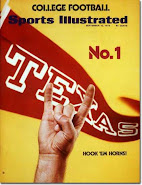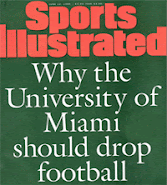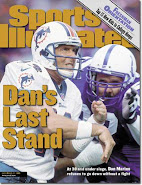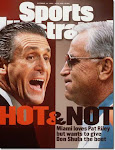The letter that I make reference to, involving The Miami Herald's coverage of the immigration issue, will be posted in the future.
____________________________________
Subject: re next week's Brookings immigration forum, and the role of Rove in immigration policy
To:"Katie Busch"
Thursday April 19th, 2007
Dear Katie:
After I received your quick response yesterday, I happened to receive my weekly Bob Novak note and found this little immigration nugget, which I've highlighted for you below in red.
There's little doubt that the role Karl Rove plays in immigration policy over the next 18 months, and whether that will necessarily be subordinate to the GOP's 2008 election dynamics -and which candidate that hurts- will be a topic much discussed next week.
Many of my Republican friends in Washington and out west, who are involved in campaigns, are greatly concerned that Rove will likely sell-out lots of swing districts in order to keep CA, CO and FL in play, and that the only parties who'll actually benefit from that will be the DC-based labor unions, that only want increased membership, regardless of what existing Union
members think about that.
Those concerns only adds to my hope that C-SPAN will make an appearance, so those of us down here in the sub-tropical hinterlands, where there are no All-News radio stations -and even NPR's local affiliate is subject to being dumped for the laborious, all-day Miami-Dade School Board meetings, as happened yesterday- can follow the action.
In a couple of days, for your perusal, I'll send you a copy of a letter that I wrote about the role of The Miami Herald locally, and how they choose to consciously ignored certain aspects of the immigration debate because it didn't fit their editorial prism, even while ABC News saw the big picture the Herald was ignoring at a 2003 public forum I attended -sponsored by the
Herald no less.
The public forum was held in downtown Miami in a room at Miami-DadeCommunity College named after the Herald's former publisher, which made their oversight all the more galling to me.
It featured then-DHS Director Tom Ridge [mentioned below in Novak note] whom I knew while he was in Congress, because of an issue I was very involved with that the late Sen. John Heinz (and his staff) were spearheading in the Senate Banking Committee.
After reading it, I think you'll clearly see why this issue is of such concern to me.
Sincerely,
Dave
http://www.SouthBeachHoosier.blogspot.com/
___________________________________________________
Wednesday April 18th, 2007
Dear Katie:
Have you heard from the folks at C-SPAN about them possible swinging
by to air or tape this event?
Thanks!
Dave
http://www.SouthBeachHoosier.blogspot.com/
____________________________________________________
Not yet Dave, but thanks for asking!
We usually won’t hear from them till 5pm the day before the event.
I’ll let you know if I hear anything.
Thanks –
Katie
************************************************
Katie Busch
Media Relations Officer
The Brookings Institution
1775 Massachusetts Ave, NW
Washington, DC 20036
Direct Line: 202/797-6467
http://www.brookings.edu/
_______________________________________
Date: Wed, 18 Apr 2007
From: "Robert Novak"
April 18, 2007
Washington, DC Vol. 42, No. 8b
To: Our Readers
Karl Rove to be kept out of immigration compromise
Earmark transparency falters in Senate
Democrats furious about Fox recess appointment
Blue Dogs stay true to party leaders
Breaux's exit dooms Louisiana Democrats.
Major McCain supporter criticizes senator's Baghdad trip
Outlook
The Supreme Court's decision this morning upholding a ban on partial-birth abortion reminds conservative voters of one of President George W. Bush's successes -- appointments to the federal courts, especially the Supreme Court. The decision is not a huge victory in practical terms, but it could conceivably mark the point at which pro-lifers stop being pushed backward in the courts.
Serious Republican economics analysts are concerned about the long-range impact of the low-interest-rate mortgage foreclosures. A recession in the 2008 election year is a real possibility, especially if the Democrat-controlled Congress tries to fix it.
Remarks yesterday by Rep. James Clyburn (D-S.C.) in favor of raising tobacco taxes illustrate the degree to which Democrats are tightening their ranks on tax issues. Clyburn, who represents a rural lowland district full of tobacco farmers, received $14,000 in campaign contributions from the tobacco industry in the last election cycle -- more than all but 34 of his 435 House colleagues. His speech suggested a tax increase on the local industry as a way of holding to "pay-go" restrictions imposed by the new Democratic majority on tax and spending bills.
Bush Administration
Immigration: The White House is letting it be known on Capitol Hill that top presidential adviser Karl Rove will play no part in President Bush's forthcoming big push to pass a compromise immigration bill. Needless to say, Rove is viewed by Democrats as evil incarnate. After serving as Bush's political brain in the 2000 and 2004 presidential elections, he has been under intensive attack this year in the Democrat-controlled Congress with demands that he be subpoenaed to testify under oath about the firing of eight U.S. attorneys. Revelations that he regularly used a Republican Party e-mail address while in the White House, and sent almost nothing through official channels, riles Democrats even more. And what's worse, his e-mails appear to be among the few that disappeared.But conservatives also view Rove with enormous suspicion, especially on the immigration issue. They tend to view Rove as Captain Ahab, with California as Moby Dick. Conservatives view his line of thought as running thus: If he can just up the Hispanic vote for Republicans by granting an amnesty, then Republicans will never lose another presidential election. Many on the right resent this notion. It is a lose-lose situation, then, to involve Rove in a process such as immigration reform that will require bipartisan cooperation.
Congress
Earmark Reform: After claiming the moral high ground on ethics and passing a bill almost unanimously that requires transparency in earmarks, the Senate's Democratic leaders have a political problem. How can they abide by their promises of earmark reform without having to abide by them?
1. Ever since the infamous "Bridge to Nowhere" in Alaska captured the public's imagination last year, Democrats have been on record against legislators' stealthily slipping in their favorite spending projects. But most senators, from both parties, really want to keep earmarks. An ingenious effort to reconcile those conflicting political desires created a remarkable tableau Tuesday in the U.S. Senate.
2. First-term Sen. Jim DeMint (R-S.C.) rose on the Senate floor shortly before noon to ask unanimous consent for immediate enactment of a rule requiring full disclosure of earmarks. But the Democratic leadership was forewarned. Eleven minutes before DeMint took the floor, Robert Byrd's (D-W.Va.) Appropriations Committee tried to pre-empt DeMint by announcing "an unprecedented policy of transparency and accountability." Byrd's reform would have no teeth, no enforcement mechanism to prevent earmarks from slipping through. Moreover, it would not affect any earmarks on direct spending bills, such as water and transportation bills. It would not have prevented the "Bridge to Nowhere."
3. The fact is, no one had anything except earmarks to lose by adopting DeMint's rule change. Majority Whip Dick Durbin (D-Ill.) objected to passage of the DeMint rule, offering the excuse that the ethics bill would somehow be slowed down if an important item like the DeMint rule were implemented on a piecemeal basis. In fact, senators covet their earmarks and fear passage of a rule change.
4. DeMint's insertion of the earmark rules into that bill was significant, but it remains useless until a bill actually passes both Houses. The ethics bill passed the Senate with the DeMint rule on January 16. DeMint rejoiced at "the intent on both sides of the aisle to make sure there is more disclosure." But the bill won't reach the House floor until this summer, and there is no guarantee that the earmark provision will survive conference. Meanwhile, a water bill is already moving, and hit has more then 800 earmark projects.
5. Senators of both parties like to be on record against earmarks while still enjoying them. The problem is that DeMint and his fellow Republican first-termer, Sen. Tom Coburn (R-Okla.), just won't let the issue rest. Amid thundering silence from the GOP leadership after Durbin's objection, Coburn reminded the Senate that Congress does not have a higher favorable rating than the President. "The reason we don't," he added, "is the very reason we just saw."
6. The non-partisan Congressional Research Service (CRS) heard a new message from the new masters of Capitol Hill. CRS on February 22 issued a directive that it "will no longer identify earmarks for individual programs, activities, entities, or individuals." That deprives DeMint, Coburn, and other reformers of their primary source of intelligence on earmarks.
7. DeMint first attempted to bring up his rule change on April 12 under unanimous consent. Freshman Sen. Bob Menendez (D-N.J.), on duty for the Democratic leadership, objected. Menendez claimed, reporter John Stanton wrote in the Roll Call newspaper, "that despite numerous news stories and notifications from DeMint that he intended to seek the UC [unanimous consent], Democrats had not been given adequate time to review the proposed amendment." DeMint announced he would try again Tuesday, and he was not alone. Besides Coburn, he was joined by Republican Senators Michael Enzi (Wyo.), Saxby Chambliss (Ga.) and John Cornyn (Tex.). That gang of five might be called the Senate Republican reform caucus.
8. That leaves the door open for earmarks on authorization bills, like the "Bridge to Nowhere." "So," Coburn told the Senate after Durbin's objection, "we will play the same game but one step further back."
9. This is no Democrat-vs.-Republican partisan struggle. The word in the Republican cloakroom was that a GOP senator would derail the DeMint rule if the Democrats did not. The Republican leadership is not enthralled with DeMint and Coburn, and would like them to go away. They won't. They are determined to reveal who sponsors and who benefits from earmarks.
Oversight: Atty. Gen. Alberto Gonzales testifies tomorrow before the Senate Judiciary Committee to defend his role in the firings of several U.S. attorneys. But this is only the beginning of what will become a government-wide step-up in oversight by Congress.
Rep. Rahm Emanuel (D-Ill.), chairman of the House Democratic Campaign Committee, plans a major speech in the next two weeks to be delivered at a nonpartisan site that will depict the controversy over President Bush's dismissal of U.S. attorneys as a part of a broader pattern of corruption. Emanuel plans to say that the U.S. attorneys issue, in the public mind, "will be to corruption what Katrina was to incompetence." He will delineate a pattern of Bush Administration abuses that include the Interior Department, General Services Administration, Federal Emergency Management Agency, and the Department of Education on student loans.
If delivered on the House floor, such an attack could be lost in harsh, partisan oratory, and so Emanuel has been searching for a nongovernmental site, such as the National Press Club or the Brookings Institution.
Recess Appointments: Democratic leaders, furious over President Bush's recess appointment of millionaire Republican contributor Sam Fox as ambassador to Belgium, are contemplating keeping the Senate in session most of August to stop the President from again circumventing the confirmation process. The plan would be to keep the usual August recess short so that Bush would be unable to submit recess nominations. Such a summer schedule would presumably include pro forma sessions that would keep short the official length of any recess.
Fox's nomination had been blocked because of his $50,000 contribution in 2004 to the Swift Boat Veterans for Truth organization that attacked presidential candidate Sen. John Kerry's (D-Mass.) record during the Vietnam War. Kerry confronted Fox in committee hearings, and the nomination was stymied until Bush was compelled to withdraw the nomination. Bush then sent Fox to Brussels without confirmation by nominating him during the Easter recess.
D.C. Voting: Democrats are expected tomorrow to bring back the question of representation for the District of Columbia. Republicans blocked the bill last time around by offering a motion to recommit the bill and add an amendment to repeal the District of Columbia's gun ban. Such a vote would have been politically devastating for Democrats, and so they pulled the bill.
Republicans had objected to the idea that Democrats would use a rule change or a closed rule to forbid such a motion to recommit on the second go-round, but now, after the shootings at Virginia Tech, Democrats have another option. They are considering allowing a gun vote and asking their members to vote "no" on the motion to recommit, to take advantage of the recent violence.
'Blue Dogs': A piece of accepted wisdom from Election 2006 is that dramatic Democratic success stemmed partly from their openness to running moderate and conservative candidates wherever it made sense. During the campaign, the party's leaders and primary voters evinced a willingness to abandon ideological purity, leading to Senate pickups in Pennsylvania, Virginia and Montana, and a governor's mansion in Arkansas.
1. Nowhere was the non-ideological Democratic strategy more successful than in last year's House races, which saw Democrats add 30 members to their caucus and elect Rep. Nancy Pelosi to the post of House speaker. But a closer look at what has happened in the first three and one-half months of this year's congressional session shows Republicans can rarely expect help from these moderate freshmen on important votes. There are exceptions, but most of the Blue Dogs are proving to be the same kind of "rubber stamps" that they criticized their Republican opponents for being during the 2006 election.
2. All of the freshman Democrats -- the supposed moderates, conservatives and liberals -- voted for the Iraq supplemental that sets a timetable for withdrawal. Even Rep. Harry Mitchell (D-Ariz.), who went to the House floor and expressed "disappointment" in his party leadership, bowed and voted "aye" when pressed. Most of them voted for the $400-billion tax hike in the Democratic budget blueprint, and several supported federal funding on scientific experiments that kill "unwanted" human embryos from fertility clinics.
3. All of the "moderate" freshmen came to the aid of Democratic union allies on the two significant labor votes this Congress. All opposed an amendment by Rep. Richard Baker (R-La.) intended to speed up the stalled reconstruction of the Gulf Coast after Hurricane Katrina by exempting federal contractors from "prevailing wage" laws. They also all backed the "Employee Free Choice Act," which would allow union lobbyists to take over workplaces through a system known as "card check."
Governor 2007
Kentucky: Despite what we perceived as a promising start, former Rep. Anne Northup (R) has flopped so far, remaining flat in the race for the Republican nomination for governor. Incumbent Gov. Ernie Fletcher (R) has run ads effective in portraying himself as the victim of Democratic attacks. Northup's ads, which began just recently, have been judged uninspiring. Fletcher's previously negligible lead has quickly grown by seven points in the most recent local poll, putting him at the all-important 40 percent mark that would allow him to avoid a runoff. Northup has stayed flat at 31 percent. Fletcher's continued poor showing in the polls still holds forth hope for Northup, but he may survive the May 22 primary. There is little question that he would win the election if it were held today. Leaning Fletcher.
Louisiana: The exit of former Sen. John Breaux (D) from consideration in this race, coupled with the decision by Lt. Gov. Mitch Landrieu (D) not to run, makes it probable that Rep. Bobby Jindal (R) will be the next governor of Louisiana. Breaux could not have done more harm than he did to the state party. By tinkering with the idea of a run for just the right amount of time, he prevented any other candidate from raising the money that would be needed.
The most serious Democrat likely to run at this point is Public Service Commissioner Foster Campbell (D), who lost his 1990 congressional race against Rep. Jim McCrery (R) after being in a car accident close to Election Day.
But no one thinks Campbell will win a race against Jindal, who announced last week that he has raised $5.1 million. Any other serious Democrat would have to start so far behind in the money game, and against a popular politician like Jindal, that it is not a winning idea.
Breaux could probably have done it, but his residency status as a Maryland voter and D.C. resident raised fears that he could run a campaign, only to be yanked from the ballot after a court challenge.
The primary election, which will be the only election if Jindal gets 50 percent, takes place October 20.
President 2008
McCain: In a private conference call with supporters of Sen. John McCain's (R-Ariz.) presidential candidacy, Former Homeland Security Secretary Tom Ridge indicated disapproval of the candidate's most recent visit to Baghdad.
Ridge, the former governor of Pennsylvania, questioned whether the Baghdad trip was McCain's idea or came from his staff, and received no clear answer. The criticism in Ridge's tone was clear: a strong supporter of Bush's Iraq policy, Ridge endorsed McCain for President on February 28.
McCain has come under fire for saying that Baghdad was safer since the U.S. troop surge and then entering the Iraqi capital under heavy security protection, including about 100 troops and two helicopters.
Thompson: Conservatives are ready to back former Sen. Fred Thompson (R-Tenn.) and to do so with a sigh of relief, even though his conservative credentials are not impeccable. All the other candidates are just too flawed, in their view. This explains the enormous surge of support for a non-candidate like Thompson. He has already leap-frogged ahead of McCain in the latest Bloomberg poll, and former New York City Mayor Rudy Giuliani continues to falter, Thompson has a shot to emerge as a candidate who is both credible enough and conservative enough to win a substantial share of the GOP primary vote.
Sincerely,
Robert D. Novak
To subscribe to the free Evans-NovakPolitical Report, please see
http://www.evansnovak.com/offers/offer.php?id=ENPR001
________________________________________________
Immigration Reform: Prospects and Possibilities
Thursday, April 26, 2007
8:30 a.m. – 10:00 a.m.
The Brookings Institution
Falk Auditorium
1775 Massachusetts Avenue, NW
Washington, DC
Congress and the Bush Administration are focused on reforming the country’s immigration policies and addressing the status of the nation’s 12 million illegal immigrants. Yet what are the prospects for real reform? And can Congress agree on legislation?
On April 26, the Brookings Institution and the Migration Policy Institute will host a discussion on comprehensive immigration reform with keynote remarks by Rep. Jeff Flake (R-Ariz.) and Luis Gutierrez (D-Ill.), the sponsors of the Security Through Regularized Immigration and a Vibrant Economy (STRIVE) Act. After their remarks, a panel of national experts will discuss the content of the proposed law and the possibilities of immigration reform in the 110th Congress.
Welcome and Introductions:
Bruce Katz, Vice President and Director, Metropolitan Policy ProgramThe Brookings Institution
Demetrios Papademetriou
President, Migration Policy Institute
Keynote Speakers:
Jeff Flake, U.S. Representative (R-Ariz.)
Luis V. Gutierrez, U.S. Representative (D-Ill.)
Moderator:
Audrey Singer, Immigration Fellow, Metropolitan Policy Program The Brookings Institution
Panelists:
Randel Johnson, Vice President for Labor, Immigration and Employee BenefitsU.S. Chamber of Commerce
Doris Meissner, Senior FellowMigration Policy Institute
Liseo Medina, International Executive Vice President Service Employees International Union
Cecilia Muñoz, Senior Vice President National Council of La Raza
RSVP: Please call the Brookings Office of Communications , 202-797-6105, or visit http://onlinepressroom.net/brookings/



































+Sep+10,+1984.jpg)










No comments:
Post a Comment